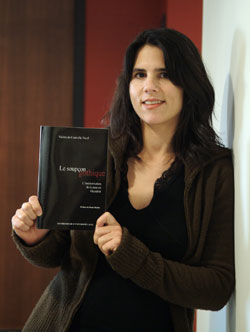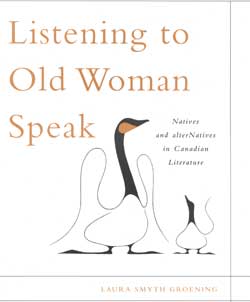The literature of fear: Valérie de Courville Nicol

Valérie de Courville Nicol (Sociology) with her exploration of Gothic novels and the meaning of fear.
photo by Kate Hutchinson
Gothic novels generally suggest windswept moors and secrets in the attic.
Valérie de Courville Nicol’s book, Le soupçon gothique: l’intériorisation de la peur en Occident, looks at gothic novels through the theories of Michel Foucault and reads them as “part of a larger process in which individuals in liberal democracies learn to govern themselves through fear.”
De Courville Nicol argues that this internalizing of fear is in contrast to the tyrannical powers attributed to political regimes based on terror. She traces the birth of the gothic novel in the 18th century to the same period Foucault sees as introducing more subtle forms of power — encouraging people to govern themselves instead of being controlled by force or violence.
A sociologist by training, de Courville Nicol became attracted to the subject as a student at Carleton, where she developed a psychoanalytic reading of Frankenstein (a text prominently featured in her book). She chose to apply Foucauldian theory to the traditional stories of “human behaviour as dangerous, menacing and out of control” and considered the ways in which gothic novels were conduct manuals for the rational, liberal subject.
Her book has just been shortlisted for the Prix Raymond-Klibansky for best French-language book in the humanities. But it represented a challenge for its author, who came to Concordia five years ago.
“I had to become an interdisciplinary scholar and understand critical literary approaches, sociology, philosophy, political science and history,” de Courville Nicol said. More to the point, “I had to make my ideas accessible and acceptable to people from different disciplines.”
The result is a close textual reading of classics like Frankenstein and Bram Stoker’s Dracula. De Courville Nicol said that she did not use traditional literary critical approaches, which presuppose hidden meaning in texts. “I look at what the novel says on the surface and the meaning it produces, understanding that I am also producing the novel’s meaning.”
De Courville Nicol is now interested in how this literature of fear and individual self-government has been translated into a neo-liberal context. To that end, she has been tracing the construction of anxiety and stress disorders through self-help literature since the middle of the last century. She is also interested in exploring whether the message is different for men and women.
“Gothic novels taught you how to restrain the dangerous uncontrollable self. Now the neoliberal understanding of the dangerous self is linked to inactivity and lack of entrepreneurship.”
Book shortlisted

English Professor Laura Smyth Groening’s book has been shortlisted for the Raymond Klibansky Prize for best English-language book in the humanities.
The book takes on debates around Native culture and cultural appropriation that heated up through the 1990s after a women’s book fair in Montreal in 1988.
Groening explores different texts and approaches using Frantz Fanon’s theories to grapple with complicated questions of identity and representation.